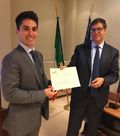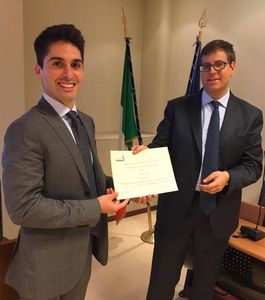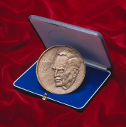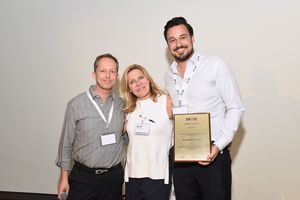
Press release: Mortal or Machine? Prizes for developers of automatic bot-recognition systems
The winners of the Munich Bot Challenge were awarded prizes at the Bavarian Academy of Sciences in the Munich Residenz. The award-winning teams developed new methods to quickly detect and block opinion-generating machines, or “social bots”, on the Internet.

Call for Papers - Munich Summer Institute 2018
Researchers who would like to present a paper are invited to submit it online until February 15, 2018 (see below).
From June 4 to 6, 2018, the Center for Law & Economics at ETH Zurich, the Chair for Technology and Innovation Management at TUM, the Institute for Strategy, Technology and Organization at LMU Munich and the Max Planck Institute for Innovation and Competition will jointly organize the third Munich Summer Institute.
The Summer Institute will focus on three areas:
- Digitization, Strategy and Organization
(chairs: Jörg Claussen and Tobias Kretschmer), - Innovation and Entrepreneurship
(chairs: Dietmar Harhoff and Joachim Henkel), and - Law & Economics of Intellectual Property and Innovation
(chair: Stefan Bechtold).
The goal of the Munich Summer Institute is to stimulate a rigorous in-depth discussion of a select number of research papers and to strengthen the interdisciplinary international research community in these areas. Researchers in economics, law, management and related fields at all stages of their career (from Ph.D. students to full professors) may attend the Munich Summer Institute as presenters in a plenary or a poster session, as discussants or as attendants. The Munich Summer Institute will feature three keynote lectures, 18 plenary presentations and a daily poster session (including a poster slam). Paper presentations will be grouped by topics, not discipline or method. The Munich Summer Institute will be held at the Bavarian Academy of Sciences and Humanities in the heart of Munich. Participation is by invitation only. The organizers will fund travel and hotel expenses for all plenary speakers and hotel expenses for all poster presenters and invited discussants.
Keynote speakers are:
- Ashish Arora (Duke University)
- Luis Cabral (New York University)
- Joel Waldfogel (University of Minnesota)
Paper submission procedure
Researchers who would like to present a paper are invited to submit their paper online until February 15, 2018, at the MSI website. The Munich Summer Institute only considers papers which have not been published or accepted for publication at the date of submission. Paper selections will be announced in March 2018. The program of the Munich Summer Institute will be available on April 1, 2018. Final papers will be made available to conference participants on a protected website, and are due on May 1, 2018. Researchers who would like to attend the Munich Summer Institute without giving a presentation should contact one of the organizers by May 1, 2018.
Further information
Any questions concerning the Munich Summer Institute should be directed to Stefan Bechtold, Jörg Claussen, Dietmar Harhoff, Joachim Henkel or Tobias Kretschmer.
Data Room Opening
As of now, the Department for Innovation and Entrepreneurship Research at the Max Planck Institute for Innovation and Competition makes own research data available to external researchers.
Data can be accessed either locally at the Max Planck Institute for Innovation and Competition, or remotely, within the scope of open access publications in the online data repository on our website.
See Data Access, Data Room and Data Repository.

Elena Messina Prize for Niccolò Galli
Niccolò Galli, doctoral student at the Max Planck Institute for Innovation and Competition, has been awarded the Elena Messina Prize by the Elena Messina Association for his dissertation “Standard essential patents litigation and abuse of a dominant position – The FRAND defense in the EU competition law context”.
The prize, endowed with EUR 1,000, is conferred annually by a scientific committee composed of five prominent Italian antitrust professionals, three officers and two lawyers, for the best dissertation in the area of competition and consumer law.
The award is just one of the initiatives of the association, all of which are devoted to promoting excellence in antitrust education and practice in the memory of Elena Messina. Messina, a young and promising lawyer who graduated summa cum laude from LUISS University with a dissertation on efficiency and consumer welfare in EU and US anti-monopoly laws, died in 2012 in a road accident. She was working for the Italian Antitrust Authority at the time.
Galli was presented with the prize by the Vice President of the Association, Filippo Alberti, on 28 September 2017 at the seat of the Antitrust Authority in Rome during the conference “Competition issues related to the freedom to connect”.

Three doctoral candidates launch their EIPIN European Joint Doctorate studies
On 1 September 2017 Letizia Tomada and Niccolò Galli from Italy, and Vicente Zafrilla from Spain began their three-year research stay at the Max Planck Institute for Innovation and Competition with a stipend from the EIPIN European Joint Doctorate program.
The subject of Tomadas’ work will be “The impact of the Unified Patent Court on innovative start-ups in the European Single Market”, while Galli will examine “Predatory patent litigation in the European competition law context” and Zafrilla will devote his research to the question “Essential patents over-declaration in standards: An anticompetitive conduct?”
The European Intellectual Property Institutes Network, or EIPIN, a network founded in 1999 to intensify the cooperation between European institutions in the area of intellectual property and their students, joined the competition for funding from the EU Horizon 2020 program in early 2016. Its concept, “Innovation Society” was awarded funding in May 2016 for a European Joint Doctorate with a proposal to examine the effects of proprietary rights on the innovation potential of a society and to answer the question how such rights must be designed in order to facilitate, and not hamper, innovation.
A total of 15 doctoral candidates were accepted into the program, which will receive funding in the amount of 3.8 million euros over a four-year period. Each EIPIN member institution will supervise three of its own candidates while functioning as a co-supervisor of three of the other EIPIN members‘ candidates. As a part of the doctoral program, candidates are to complete internships at top European organisations in innovative branches (including telecommunications, music and seeds) and take part in seminars (e.g. on scientific working methods).
EIPIN’s members are the Munich Intellectual Property Law Center (MIPLC), Queen Mary University of London, University of Strasbourg (CEIPI), Alicante University and Maastricht University. The Max Planck Institute for Innovation and Competition, which was involved in the funding application as a supporting institution and which is one of the pillars of the MIPLC, will collaborate with the University of Augsburg in implementing the program and will also supervise doctoral candidates.
We grieve for Prof. Dr. Dres. h.c. Arnold Picot
On 9 July 2017, Prof. Dr. Dres. h.c. Arnold Picot passed away suddenly and unexpectedly.
Arnold Picot was Professor Emeritus of the Munich School of Management (LMU Munich), where he taught and carried out his research since 1987. He was a close friend to the institute as well as a committed supporter, teacher, advisor, and mentor to many colleagues and students. He was one of the initiators of the International Max Planck Research School for Competition and Innovation (IMPRS-CI) which marks a first significant step towards the establishment of the department for Innovation and Entrepreneurship Research. Since 2014, he was a member of the Advisory Board of the Max Planck Institute for Innovation and Competition.
The institute has lost a well-respected and warm-hearted colleague. He will be sadly missed and held in grateful memory.
Workshop "Internet of Things (IoT) Connectivity Standards"
On April 25, 2017, the Max Planck Institute for Innovation and Competition held the workshop "IoT Connectivity Standards" at its venues in Munich. The workshop was the first of a series in the context of the research project "Standards for the Internet of Things".
With the workshop series the Institute seeks, first, to discuss with experts and practitioners in which direction the Internet of Things will develop with regard to standardization, and second, to identify the economic and regulatory implications of those changes.
The workshop focused on connectivity standards enabling interoperability between multiple devices and across different communication networks. It consisted of three distinct panels:
- Technology and Market Landscape: The objective of this panel was to get insights from indus-try representatives on the evolving landscape of current and future technologies providing machine to machine communication as well as on how the IoT is changing the business and market environment, both in general and with regard to the IoT connectivity market.
- Standardization Landscape: Representatives of different standard setting organizations, industry consortia and technology companies explained the current stage of standardization activities in the field of IoT connectivity. Beyond this mapping exercise, more fundamental questions were addressed, such as how technology and market complexity affect the standardization process and what are the optimal roles of standard setting organizations, industry allianc-es and stakeholder groups in the IoT standard development.
- IPRs Landscape: IP lawyers from different stakeholders presented their views on the role that Intellectual Property Rights will play in the IoT context and, more specifically, on the challenges that the increased need for connectivity and interoperability creates with regard to access to patented standardized technology.
The presentations and discussions at the workshop provided useful insights for the assessment and analysis of the economic, legal and regulatory implications of standardization in the field of IoT con-nectivity. Among them, the event’s organizers, Dr. Beatriz Conde Gallego and Dr. Fabian Gaessler of the Max Planck Institute for Innovation and Competition, highlighted that “the need for wide common standards is less pronounced at the connectivity level than at higher levels (e.g. semantic interoperability), mainly because no single connectivity technology will be able to satisfy all industry needs. Various connectivity standards will coexist and complement each other in the future. At the same time, a successful implementation of these standards will certainly require transparent, predictable and flexible licensing schemes which reflect the heterogeneous conditions of IoT applications and the diversity of stakeholders involved in the IoT value chain.”

Fabian Gaessler receives Otto Hahn Medal of the Max Planck Society
Fabian Gaessler has been awarded the Otto Hahn Medal for his thesis “Enforcing and Trading Patents – Evidence for Europe” during the 68th General Meeting of the Max Planck Society in Weimar.
The Max Planck Society awards the prize, endowed with EUR 7,500, with the intention to motivate talented junior scientists and researchers to pursue a future research career.
Fabian Gaessler’s thesis is dedicated to the empirical study of the enforcement and trade of patent rights in Europe. The means available to an inventor to enforce his exclusive right against others and/or to sell his protected idea represent fundamental preconditions for a functioning patent system, and ultimately for incentivizing innovation. Fabian Gaessler uses quantitative methods to address inter alia the question as to what extent the current institutional design in Germany is conducive to patent enforcement and whether it qualifies as a blueprint for a European unified system.
Since 1978, the Max Planck Society honors up to 30 young scientists and researchers every year with the Otto Hahn Medal for outstanding scientific achievement - to date, more than 940 scientists and researchers.

Michael Moedl receives the Steven Klepper Award for Best Young Scholar Paper at the DRUID17 Conference
Michael Moedl has received the Steven Klepper Award for Best Young Scholar Paper for his paper “Is Wisdom of the Crowd a Positive Signal? Effects of Crowdfinancing on Subsequent Venture Capital Selection“ during the DRUID17 Conference in New York.
The paper examines the impact and signaling effects of crowdfinancing on subsequent venture capital funding rounds. Drawing on a choice experimental research design the author finds causal evidence that crowdfunding – relative to other prefunding sources – is often a negative signal for professional venture investors, but that the “crowd” can nonetheless and under certain circumstances send positive signals increasing the likelihood of subsequent financing rounds.
Workshop “European Intellectual Property Rights and Jurisdiction in Need of a Grand Design?”
From March 16 to 18, 2017, the Max Planck Institute for Innovation and Competition organized the workshop “European Intellectual Property Rights and Jurisdiction in Need of a Grand Design?” at the Harnackhaus in Berlin.
The workshop focused on four areas:
- Legal Aspects: Union-wide IP Rights plus Copyrights: The Status Quo including the Role of the ECJ (chair: Matthias Leistner); Patents: The Status Quo including EPO and UPC and the Role of the ECJ (chair: Axel Metzger),
- Empirical Insights (chair: Annette Kur): EU Trade Mark Infringement Litigation; Patent Litigation,
- Deficits and Perspectives in the Jurisdiction of IP Rights (chair: Paul Torremans), and
- Conclusions: In Need of a Grand Design? (chair: Reto Hilty).
The purpose of the event with 40 experts from Germany, Belgium, the Netherlands, Italy, Denmark, Poland, Austria, the United Kingdom, Switzerland and the United States, was to identify deficits and research perspectives for further developing the EU jurisdiction scheme.
The event's organizers, Roland Knaak and Roberto Romandini of the Max Planck Institute for Innovation and Competition, summed up the results: “EU jurisdiction varies widely in its approach to the intellectual property rights. Union-wide jurisdiction is only provided under certain circumstances. For the existing unitary IP Rights, especially trademarks and designs, the Regulations on these rights transfer jurisdiction to the national courts of the Member States, which in certain cases have Union-wide competence. The remaining problems with a Union-wide enforcement of these rights could be mitigated, and possibly overcome, by including further substantive provisions in the Regulations. For European patents with or without unitary effect, the UPC model aiming at establishing Union-wide jurisdiction has been put into question by Great Britain’s impending exit from the EU. Much is still uncertain, and some legal questions concerning the UK´s UPCA membership can only be clearly resolved by the CJEU. As regards copyright law, different models for further developing jurisdiction are conceivable. The options range from shifting the competence to interpret EU copyright provisions from the CJEU to the General Court and limiting the CJEU´s function to questions of primary law, to the establishment of a unitary copyright and EU specialized courts in the sense of the TFEU. A uniform and overarching structure of jurisdiction for all European IP rights is not emerging. It will be the task of fundamental research to work on a model that is capable of consensus.”
See Program






